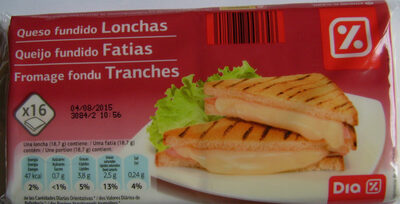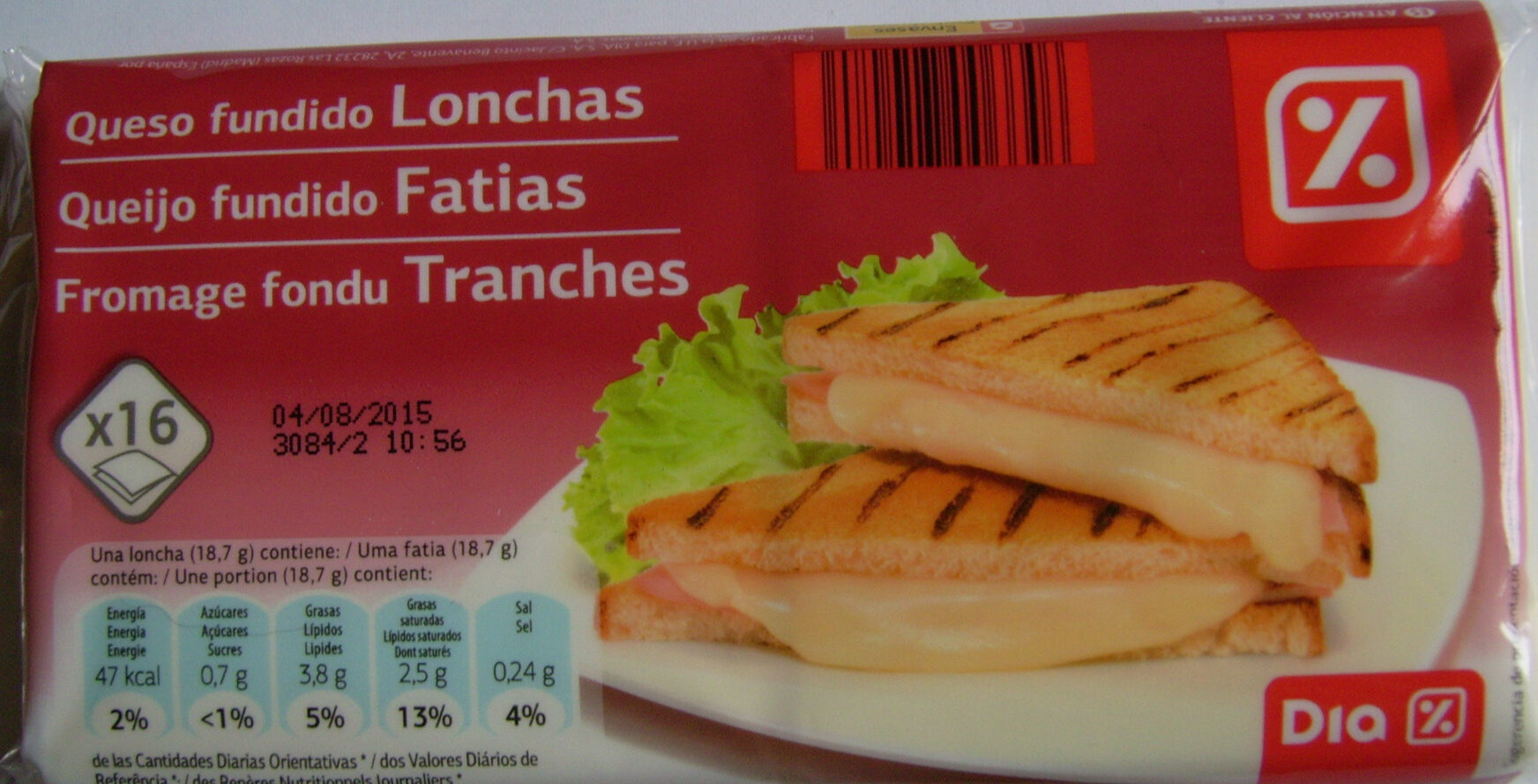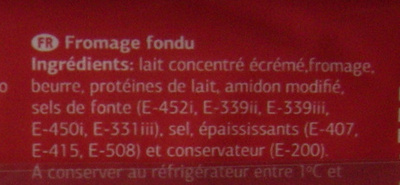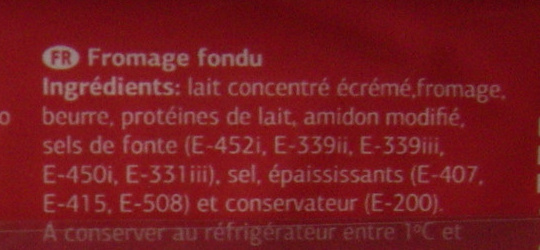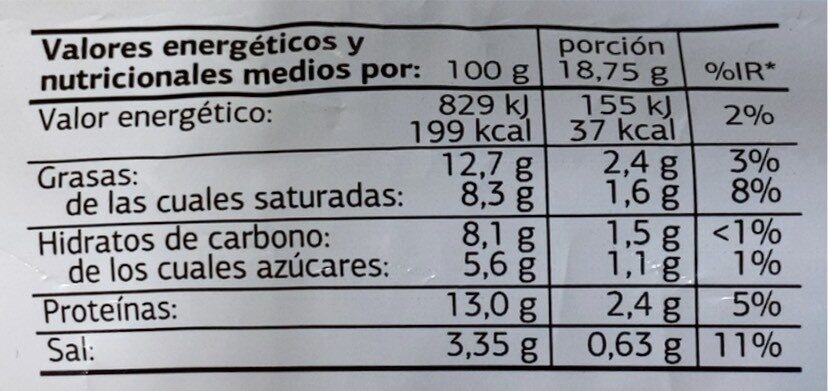Help us make food transparency the norm!
As a non-profit organization, we depend on your donations to continue informing consumers around the world about what they eat.
The food revolution starts with you!
Fromage fondu tranches - Dia - 300 g
Fromage fondu tranches - Dia - 300 g
This product page is not complete. You can help to complete it by editing it and adding more data from the photos we have, or by taking more photos using the app for Android or iPhone/iPad. Thank you!
×
Barcode: 8480017006646 (EAN / EAN-13)
Common name: Fromage fondu tranches
Quantity: 300 g
Packaging: fr:Sachet plastique, fr:Sachet plastique individuel
Brands: Dia
Categories: Dairies, Fermented foods, Fermented milk products, Cheeses, Sliced cheeses, Melted cheese
Labels, certifications, awards:
No gluten, Green Dot
Origin of ingredients: Spain
Traceability code: ES 15.359/O C CE
Stores: Dia
Matching with your preferences
Health
Ingredients
-
18 ingredients
skimmed condensed milk, cheese, butter, milk protein, modified starch, cast iron salt (e-452i, e-339ii, e-339iii, e-450i, e-331iii), salt, thickeners (e-407, e-415, e-508) and preservative (e-200)Allergens: Milk
Food processing
-
Ultra processed foods
Elements that indicate the product is in the 4 - Ultra processed food and drink products group:
- Additive: E14XX - Modified Starch
- Additive: E407 - Carrageenan
- Additive: E415 - Xanthan gum
- Additive: E450 - Diphosphates
- Additive: E452 - Polyphosphates
- Ingredient: Milk proteins
- Ingredient: Thickener
Food products are classified into 4 groups according to their degree of processing:
- Unprocessed or minimally processed foods
- Processed culinary ingredients
- Processed foods
- Ultra processed foods
The determination of the group is based on the category of the product and on the ingredients it contains.
Additives
-
E200 - Sorbic acid
Sorbic acid: Sorbic acid, or 2‚4-hexadienoic acid, is a natural organic compound used as a food preservative. It has the chemical formula CH3-CH-4CO2H. It is a colourless solid that is slightly soluble in water and sublimes readily. It was first isolated from the unripe berries of the Sorbus aucuparia -rowan tree-, hence its name.Source: Wikipedia
-
E331 - Sodium citrates
Sodium citrate: Sodium citrate may refer to any of the sodium salts of citrate -though most commonly the third-: Monosodium citrate Disodium citrate Trisodium citrateThe three forms of the salt are collectively known by the E number E331. Sodium citrates are used as acidity regulators in food and drinks, and also as emulsifiers for oils. They enable cheeses to melt without becoming greasy.Source: Wikipedia
-
E331iii - Trisodium citrate
Sodium citrate: Sodium citrate may refer to any of the sodium salts of citrate -though most commonly the third-: Monosodium citrate Disodium citrate Trisodium citrateThe three forms of the salt are collectively known by the E number E331. Sodium citrates are used as acidity regulators in food and drinks, and also as emulsifiers for oils. They enable cheeses to melt without becoming greasy.Source: Wikipedia
-
E339 - Sodium phosphates
Sodium phosphates: Sodium phosphate is a generic term for a variety of salts of sodium -Na+- and phosphate -PO43−-. Phosphate also forms families or condensed anions including di-, tri-, tetra-, and polyphosphates. Most of these salts are known in both anhydrous -water-free- and hydrated forms. The hydrates are more common than the anhydrous forms.Source: Wikipedia
-
E339ii - Disodium phosphate
Sodium phosphates: Sodium phosphate is a generic term for a variety of salts of sodium -Na+- and phosphate -PO43−-. Phosphate also forms families or condensed anions including di-, tri-, tetra-, and polyphosphates. Most of these salts are known in both anhydrous -water-free- and hydrated forms. The hydrates are more common than the anhydrous forms.Source: Wikipedia
-
E339iii - Trisodium phosphate
Sodium phosphates: Sodium phosphate is a generic term for a variety of salts of sodium -Na+- and phosphate -PO43−-. Phosphate also forms families or condensed anions including di-, tri-, tetra-, and polyphosphates. Most of these salts are known in both anhydrous -water-free- and hydrated forms. The hydrates are more common than the anhydrous forms.Source: Wikipedia
-
E407 - Carrageenan
Carrageenan (E407), derived from red seaweed, is widely employed in the food industry as a gelling, thickening, and stabilizing agent, notably in dairy and meat products.
It can exist in various forms, each imparting distinct textural properties to food.
However, its degraded form, often referred to as poligeenan, has raised health concerns due to its potential inflammatory effects and its classification as a possible human carcinogen (Group 2B) by the International Agency for Research on Cancer (IARC).
Nevertheless, food-grade carrageenan has been deemed safe by various regulatory bodies when consumed in amounts typically found in food.
-
E415 - Xanthan gum
Xanthan gum (E415) is a natural polysaccharide derived from fermented sugars, often used in the food industry as a thickening and stabilizing agent.
This versatile food additive enhances texture and prevents ingredient separation in a wide range of products, including salad dressings, sauces, and gluten-free baked goods.
It is considered safe for consumption even at high intake amounts.
-
E450 - Diphosphates
Diphosphates (E450) are food additives often utilized to modify the texture of products, acting as leavening agents in baking and preventing the coagulation of canned food.
These salts can stabilize whipped cream and are also found in powdered products to maintain their flow properties. They are commonly present in baked goods, processed meats, and soft drinks.
Derived from phosphoric acid, they're part of our daily phosphate intake, which often surpasses recommended levels due to the prevalence of phosphates in processed foods and drinks.
Excessive phosphate consumption is linked to health issues, such as impaired kidney function and weakened bone health. Though diphosphates are generally regarded as safe when consumed within established acceptable daily intakes, it's imperative to monitor overall phosphate consumption to maintain optimal health.
-
E508 - Potassium chloride
Potassium chloride: Potassium chloride -KCl- is a metal halide salt composed of potassium and chlorine. It is odorless and has a white or colorless vitreous crystal appearance. The solid dissolves readily in water and its solutions have a salt-like taste. KCl is used as a fertilizer, in medicine, in scientific applications, and in food processing. In a few states of the United States it is used to cause cardiac arrest as the third drug in the "three drug cocktail" for executions by lethal injection. It occurs naturally as the mineral sylvite, and in combination with sodium chloride as sylvinite.The version for injection is on the World Health Organization's List of Essential Medicines, the most important medications needed in a basic health system.Source: Wikipedia
Ingredients analysis
-
Palm oil free
No ingredients containing palm oil detected
-
Non-vegan
Non-vegan ingredients: Condensed skimmed milk, Cheese, Butter, Milk proteins
-
Vegetarian status unknown
Unrecognized ingredients: E339ii
-
Details of the analysis of the ingredients
fr: Lait concentré écrémé, fromage, beurre, protéines de lait, amidon modifié, sel de fonte (e452i, e339ii, e339iii, e450i, e331iii), sel, épaississants (e407, e415, e508), conservateur (e200)- Lait concentré écrémé -> en:condensed-skimmed-milk - vegan: no - vegetarian: yes - ciqual_proxy_food_code: 19051 - percent_min: 11.1111111111111 - percent_max: 100
- fromage -> en:cheese - vegan: no - vegetarian: maybe - ciqual_proxy_food_code: 12999 - percent_min: 0 - percent_max: 50
- beurre -> en:butter - vegan: no - vegetarian: yes - ciqual_proxy_food_code: 16400 - percent_min: 0 - percent_max: 33.3333333333333
- protéines de lait -> en:milk-proteins - vegan: no - vegetarian: yes - percent_min: 0 - percent_max: 25
- amidon modifié -> en:modified-starch - vegan: yes - vegetarian: yes - ciqual_proxy_food_code: 9510 - percent_min: 0 - percent_max: 20
- sel de fonte -> en:emulsifying-salts - percent_min: 0 - percent_max: 16.6666666666667
- e452i -> en:e452i - vegan: yes - vegetarian: yes - percent_min: 0 - percent_max: 16.6666666666667
- e339ii -> en:e339ii - percent_min: 0 - percent_max: 8.33333333333333
- e339iii -> en:e339iii - vegan: yes - vegetarian: yes - percent_min: 0 - percent_max: 5.55555555555556
- e450i -> en:e450i - vegan: yes - vegetarian: yes - percent_min: 0 - percent_max: 4.16666666666667
- e331iii -> en:e331iii - vegan: yes - vegetarian: yes - percent_min: 0 - percent_max: 3.33333333333333
- sel -> en:salt - vegan: yes - vegetarian: yes - ciqual_food_code: 11058 - percent_min: 0 - percent_max: 3.35
- épaississants -> en:thickener - percent_min: 0 - percent_max: 3.35
- e407 -> en:e407 - vegan: yes - vegetarian: yes - percent_min: 0 - percent_max: 3.35
- e415 -> en:e415 - vegan: yes - vegetarian: yes - percent_min: 0 - percent_max: 1.675
- e508 -> en:e508 - vegan: yes - vegetarian: yes - percent_min: 0 - percent_max: 1.11666666666667
- conservateur -> en:preservative - percent_min: 0 - percent_max: 3.35
- e200 -> en:e200 - vegan: yes - vegetarian: yes - percent_min: 0 - percent_max: 3.35
Nutrition
-
Poor nutritional quality
⚠ ️Warning: the amount of fruits, vegetables and nuts is not specified on the label, it was estimated from the list of ingredients: 0This product is not considered a beverage for the calculation of the Nutri-Score.
Positive points: 5
- Proteins: 5 / 5 (value: 13, rounded value: 13)
- Fiber: 0 / 5 (value: 0, rounded value: 0)
- Fruits, vegetables, nuts, and colza/walnut/olive oils: 0 / 5 (value: 0, rounded value: 0)
Negative points: 21
- Energy: 2 / 10 (value: 833, rounded value: 833)
- Sugars: 1 / 10 (value: 5.6, rounded value: 5.6)
- Saturated fat: 8 / 10 (value: 8.3, rounded value: 8.3)
- Sodium: 10 / 10 (value: 1340, rounded value: 1340)
The points for proteins are counted because the product is in the cheeses category.
Nutritional score: (21 - 5)
Nutri-Score:
-
Nutrient levels
-
Fat in moderate quantity (12.7%)
What you need to know- A high consumption of fat, especially saturated fats, can raise cholesterol, which increases the risk of heart diseases.
Recommendation: Limit the consumption of fat and saturated fat- Choose products with lower fat and saturated fat content.
-
Saturated fat in high quantity (8.3%)
What you need to know- A high consumption of fat, especially saturated fats, can raise cholesterol, which increases the risk of heart diseases.
Recommendation: Limit the consumption of fat and saturated fat- Choose products with lower fat and saturated fat content.
-
Sugars in moderate quantity (5.6%)
What you need to know- A high consumption of sugar can cause weight gain and tooth decay. It also augments the risk of type 2 diabetes and cardio-vascular diseases.
Recommendation: Limit the consumption of sugar and sugary drinks- Sugary drinks (such as sodas, fruit beverages, and fruit juices and nectars) should be limited as much as possible (no more than 1 glass a day).
- Choose products with lower sugar content and reduce the consumption of products with added sugars.
-
Salt in high quantity (3.35%)
What you need to know- A high consumption of salt (or sodium) can cause raised blood pressure, which can increase the risk of heart disease and stroke.
- Many people who have high blood pressure do not know it, as there are often no symptoms.
- Most people consume too much salt (on average 9 to 12 grams per day), around twice the recommended maximum level of intake.
Recommendation: Limit the consumption of salt and salted food- Reduce the quantity of salt used when cooking, and don't salt again at the table.
- Limit the consumption of salty snacks and choose products with lower salt content.
-
-
Nutrition facts
Nutrition facts As sold
for 100 g / 100 mlAs sold
per serving (1g)Compared to: Melted cheese Energy 833 kj
(199 kcal)8.33 kj
(1 kcal)-21% Fat 12.7 g 0.127 g -37% Saturated fat 8.3 g 0.083 g -36% Carbohydrates 8.1 g 0.081 g +71% Sugars 5.6 g 0.056 g +61% Fiber - - Proteins 13 g 0.13 g +2% Salt 3.35 g 0.034 g +60% Fruits‚ vegetables‚ nuts and rapeseed‚ walnut and olive oils (estimate from ingredients list analysis) 0 % 0 %
Environment
-
Eco-Score C - Moderate environmental impact
⚠ ️Select a country in order to include the full impact of transportation.The Eco-Score is an experimental score that summarizes the environmental impacts of food products.→ The Eco-Score was initially developped for France and it is being extended to other European countries. The Eco-Score formula is subject to change as it is regularly improved to make it more precise and better suited to each country.Life cycle analysis
-
Average impact of products of the same category: C (Score: 47/100)
Category: Processed cheese with fresh cream cheese and walnuts
Category: Processed cheese with fresh cream cheese and walnuts
- PEF environmental score: 0.59 (the lower the score, the lower the impact)
- including impact on climate change: 5.44 kg CO2 eq/kg of product
Stage Impact Agriculture
81.7 %Processing
10.8 %Packaging
2.7 %Transportation
2.9 %Distribution
1.5 %Consumption
0.4 %
Bonuses and maluses
-
Origins of ingredients with a medium impact
Bonus: +3
Environmental policy: +3
Transportation: 0
Origin of the product and/or its ingredients % of ingredients Impact Spain 100 %Medium
-
Packaging with a medium impact
Malus: -10
Shape Material Recycling Impact Bag Plastic High
Eco-Score for this product
-
Impact for this product: C (Score: 40/100)
Product: Fromage fondu tranches - Dia - 300 g
Life cycle analysis score: 47
Sum of bonuses and maluses: -7
Final score: 40/100
-
Carbon footprint
-
Equal to driving 2.8 km in a petrol car
544 g CO² per 100g of product
The carbon emission figure comes from ADEME's Agribalyse database, for the category: Processed cheese with fresh cream cheese and walnuts (Source: ADEME Agribalyse Database)
Stage Impact Agriculture
83.4 %Processing
8.4 %Packaging
3.4 %Transportation
4.0 %Distribution
0.7 %Consumption
0.1 %
Packaging
-
Packaging with a medium impact
-
Packaging parts
Bag (Plastic)
-
Packaging materials
Material % Packaging weight Packaging weight per 100 g of product Plastic
-
Transportation
-
Origins of ingredients
Origins of ingredients with a medium impact
Origin of the product and/or its ingredients % of ingredients Impact Spain 100 %Medium
Report a problem
-
Incomplete or incorrect information?
Category, labels, ingredients, allergens, nutritional information, photos etc.
If the information does not match the information on the packaging, please complete or correct it. Open Food Facts is a collaborative database, and every contribution is useful for all.
Data sources
Product added on by openfoodfacts-contributors
Last edit of product page on by thaialagata.
Product page also edited by chevalstar, ecoscore-impact-estimator, guezguez-majed, halal-app-chakib, hangy, inf, kiliweb, oc84, packbot, quechoisir, roboto-app, scanbot, tacite-mass-editor, yuka.WktZcUlvdFIrTXNPaWRzc3hBTE54TzU0NHBPRUFHeUhKOU16SUE9PQ, yuka.sY2b0xO6T85zoF3NwEKvlh0XTNT-gmnjJxDUkxPa9IagKMbra-gq-bHaLKg, yuka.sY2b0xO6T85zoF3NwEKvlkFcC-uPgTLrCCDVp3LXwMuJHKG2fclA4JnZYqs, yuka.sY2b0xO6T85zoF3NwEKvlkxOdf7vji3BDUzth3OE_f6JPLXTSsF2-qyibao, yuka.sY2b0xO6T85zoF3NwEKvlmFNVOvknDmVERnlv2PQ_sWzdo3ZcP9L3YfRKag, yuka.sY2b0xO6T85zoF3NwEKvlnROf4PArBCfFCzVm2Cs3PzVIca1YvJt77bGbqo.
